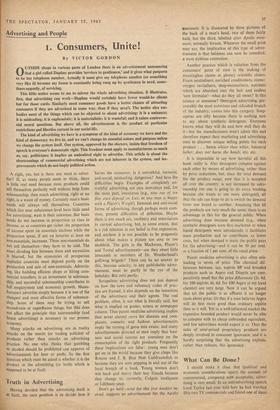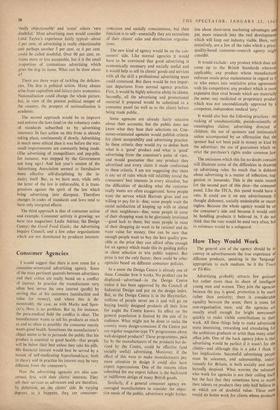What Can Be Done?
1 should make it clear that (political and economic considerations apart) the amount of controversial, compared with acceptable, adver- tising is very small. In an anti-advertising speech Lord Taylor last year told how he had watched fifty-two TV commercials and found one of them 'really objectionable' and 'some' others 'very doubtful' Most advertising men would consider Lord Taylor's experience fairly typical—about 2 per cent. of advertising is really objectionable and perhaps another 5 per cent. or 6 per cent. could be called doubtful. Over 90 per cent. re- mains more or less acceptable, but it is the small proportion of contentious advertising which gives the dog its name. What can be done about it?
There are three ways of tackling the deficien- cies. The first is political action. Many abuses arise from capitalism and laissez-faire economics. Nationalisation could change the whole picture, but, in view of the present political temper of the country, the prospect of nationalisation is academic.
The second approach would be to improve and enforce the laws (and/or the voluntary codes of standards subscribed to by advertising interests). In fact action on this front is already taking place, continuously if slowly. Advertising is much more ethical than it was before the war; small improvements are constantly being made. (The advertising of tranquillisers and pep-pills, for instance, was stopped by the Government not long ago.) And last year's session of the Advertising Association seemed to foreshadow more effective self-disciplining by the in- dustry itself. But, as we have seen, while only the letter of the law is enforceable, it is trans- gressions against the spirit of the law which bring advertising into disrepute. Therefore changes in codes of standards and laws tend to have only marginal effects.
The third approach is that of consumer action and example. Consumer activity is growing; we have two magazines; Leslie Adrian; the Design Centre; the Good Food Guide; the Advertising Inquiry Council, and a few other organisations which are not dominated by producer interests.































 Previous page
Previous page